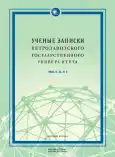LANGUAGE MEANS OF EXPRESSING IMPERATIVENESS IN THE TEXT OF 1782 DEANERY CHARTER
- Authors: Kulebakina A.A.1
-
Affiliations:
- Saint PetersburgState University
- Issue: Vol 45, No 4 (2023)
- Pages: 41-47
- Section: RUSSIAN LANGUAGE. NATIONAL LANGUAGES OF RUSSIA
- URL: https://journal-vniispk.ru/2542-1077/article/view/295381
- DOI: https://doi.org/10.15393/uchz.art.2023.905
- EDN: https://elibrary.ru/BKYNDA
- ID: 295381
Cite item
Full Text
Abstract
The tasks of official documents of the 18th century included the regulation of the employees’ activitiesin a particular sphere of public life and the transmission of state values. This was the reason for the careful selection oflinguistic means. In the era of Catherine the Great, the language of documents was changed. These changes were as-sociated, on the one hand, with the leaving from the traditions of the language of the 17th century, and on the other hand,with the strengthening of the influence of European languages. The article examines linguistic means for expressingimperativeness and analyzes its use cases in the text of 1782 Deanery Charter. The performed analysis demonstrates alinguistic convergence of the text of the charter with European language models. Along with the independent infinitive,imperativeness is expressed through verbs in the present tense, modifiers dolzhen ‘must’ and objazan ‘be obliged’ incombination with the infinitive. A two-part sentence model was spread in the text of the charter. Some syntactic con-structions that were widely used in the era of Peter the Great were becoming less common and are being replaced. The softened tonality of the document is noted. It is assumed that the reasons for these changes could be due to the influence of the sources underlying the charter, as well as the influence of the philosophical and legal ideas of “enlightened absolutism”.
About the authors
A. A. Kulebakina
Saint PetersburgState University
Author for correspondence.
Email: annakovaleva2014@mail.ru
References
Supplementary files








